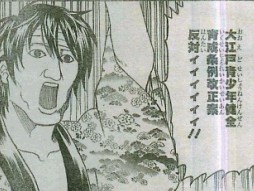News
Tokyo's 'Nonexistent Youth' Bill Faces Defeat in June
posted on by Egan Loo
 The Democratic Party of Japan, the largest faction in the Tokyo Metropolitan Assembly, formally decided on May 25 to oppose a bill to regulate sexualized depictions of "nonexistent youths." With three factions expressing their opposition on May 28, the bill faces defeat if it is put to a vote during the assembly's current June session.
The Democratic Party of Japan, the largest faction in the Tokyo Metropolitan Assembly, formally decided on May 25 to oppose a bill to regulate sexualized depictions of "nonexistent youths." With three factions expressing their opposition on May 28, the bill faces defeat if it is put to a vote during the assembly's current June session.
The current draft of the bill would prohibit sexualized depictions of "nonexistent youths" — such as in manga, anime, and other materials — from being sold to minors. The bill defines "nonexistent youths" as characters that appear or sound to be younger than 18 years old. It would also designate material that deal with "anti-social acts" of sexual nature, such as rape and incest, as "harmful publications." Under Tokyo's existing Youth Healthy Development Ordinance, minors are prohibited from buying or reading "harmful publications."
The legislation is being pushed by the Liberal Democratic Party (LDP) — the second largest faction in the assembly — and its allied parties. The DPJ is the largest faction with 53 out of 127 seats, but the governor of Tokyo is Shintarō Ishihara of the LDP. The Japanese Communist Party (8 seats), the Tokyo Seikatsusha Network party (3 seats), and the lone member of the Jichi Shimin'93 faction also oppose the bill; combined with the DPJ, they hold a slim majority of the seats in the assembly.
Also on May 25, 1,421 manga creators (including Doraemon's Fujiko Fujio A, Ashita no Joe's Tetsuya Chiba, and They Were Eleven's Moto Hagio) and 10 publishing companies voiced their opposition to the bill over concerns about freedom of expression. 917 creators and the same 10 publishing companies (including Kodansha, Shueisha, Shogakukan, Kadokawa Shoten, and Akita Shoten) had already issued a statement in opposition in March. The Japan Pen Club, an organization of authors led by Takashi Atōda, also protested the bill. The Japan Cartoonists Association formally opposed the bill on March 28, and the Writers Guild of Japan added its voice to the opposition on May 31.
The Nippon Keizai Shimbun paper reported on Saturday that the Tokyo Metropolitan Government intends to revise the bill to address the criticism and re-introduce the bill in September or later. In particular, even Governor Ishihara acknowledged that the term "nonexistent youths" (hi-jitsuzai shōnen) and similar language in the bill were vague and unsuitable.
In this year's 26th issue of Shueisha's Weekly Shonen Jump magazine, creator Hideaki Sorachi referenced the controversy in Gintama, his manga set in an alternate-world Tokyo (Ōedo) that was invaded by aliens 150 years ago. In the installment published last Monday, a character (pictured above) yells, "I object to the Ōedo Youth Healthy Development Ordinance Revision Bill!" He adds later, "One should regulate their own heart before attempting to regulate free speech!! There were lolicon far back in the past before there was manga, the Internet, anime!! What's important is to have the heart to face those desires and control them instead of trying to put a lid on them!! Now let me just state that I'm not a lolicon, but instead a feminist."
In addition to the previously announced Hi-Jitsuzai Shōnen Dokuhon" (Nonexistent Youth Reader) book from Tokuma Shoten, Cyzo published another 128-page book on the issue on Tuesday. The Hi-Jitsuzai Seishōnen (Kisei Hantai) Dokuhon" (Nonexistent Youth Restriction Protestor's Reader) printed a number of essays, including one by translator and production consultant Dan Kanemitsu about his experience assembling creators to meet with assembly members. (Kanemitsu also wrote an essay in Tokuma's book.)
Thanks to Dan Kanemitsu for the news tips and extensive background research.
Sources: Mainichi (link 2), Asahi, Sankei via Temple Knights, animeanime.biz, Natalie, Nikkei, To Love-ru Kōsatsu via Su-gomori
this article has been modified since it was originally posted; see change history